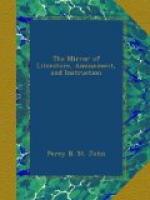THE MIRROR OF LITERATURE, AMUSEMENT, AND INSTRUCTION.
Vol. XII, no. 339.] Saturday, November 8, 1828. [Price 2d.
Great Milton.
[Illustration: Great Milton.]
Great Milton, a picturesque village, near Thame, in Oxfordshire, is entitled to notice in the annals of literature, as the family seat of the MILTONS, ancestors of Britain’s illustrious epic poet. Of this original abode, our engraving is an accurate representation. One of Milton’s ancestors forfeited his estate in the turbulent times of York and Lancaster. “Which side he took,” says Johnson, “I know not; his descendant inherited no veneration for the White Rose.” His grandfather was under ranger of the forest of Shotover, Oxon, who was a zealous Papist, and disinherited his son for becoming a Protestant. Milton’s father being thus deprived of his family property, was compelled to quit his studies at Christ Church, Oxford, whence he went to London, and became a scrivener. He was eminent for his skill in music;[1] and from his reputation in his profession, he grew rich, and retired. He was likewise a classical scholar, as his son addresses him in one of his most elaborate Latin verses. He married a lady of the name of Caston, of a Welsh family, by whom he had two sons, John, the poet,[2] and Christopher, who studied the law, became a bencher of the Inner Temple, was knighted at a very advanced age, and raised by James II. first to be a Baron of the Exchequer, and afterwards one of the Judges of the Common Pleas. He was much persecuted by the republicans for his adherence to the royal cause, but his composition with them was effected by his brother’s interest.
[1] Dr. Burney says he was
“equal in science, if not in genius, to
the
best musicians of his age.”
[2] Born in his father’s
house, at the Spread Eagle in Bread-street,
Cheapside,
December 9, 1608.
Besides these two sons, he had a daughter, Anne, who was married to a Mr. Edward Philips, of Shrewsbury; by him she had two sons, John and Edward, who were educated by the poet, and from whom is derived the only authentic account of his domestic manners.
Milton was thus by birth a gentleman; but had his descent been otherwise, his works would ennoble him to posterity.
The lord, by giddy fortune courted,
Stalks through a part by thousands
played;
The minstrel, proud and unsupported,
Stands forth the Noble God
has made[3]
[3] W. Kennedy—in the Amulet for 1829.
We sought our illustration of great Milton in the “Oxfordshire” of that voluminous and expensive work, “the Beauties of England and Wales;” but, strange to say, the family name of Milton is not even mentioned there, although the house is still
By chance or Nature’s changing course untrimm’d.




